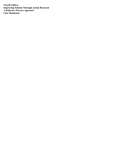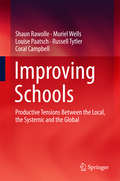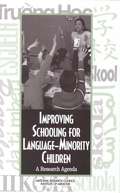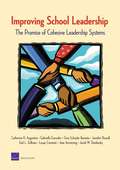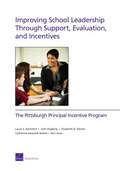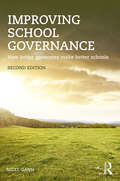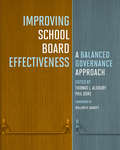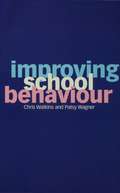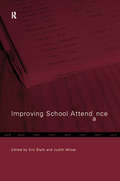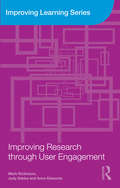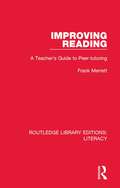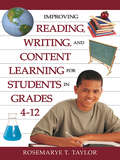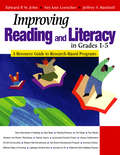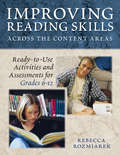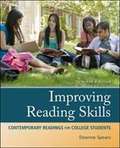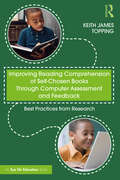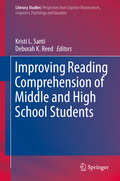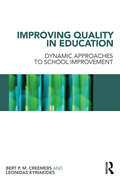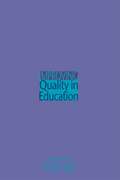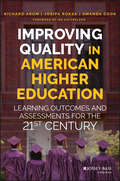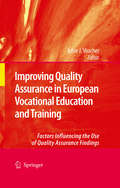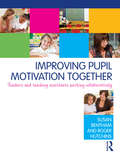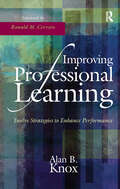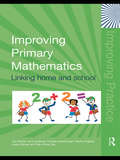- Table View
- List View
Improving Schools Through Action Research: A Reflective Practice Approach
by Cher HendricksA brief, user-friendly, solid look at the action research cycle and the knowledge to work through each step. <p><p>In Cher Hendricks’s Improving Schools Through Action Research, educators learn what they need to know about the action research cycle and get practical help for working through each step of the cycle–from choosing a topic and generating research questions to analyzing data and reporting results and conclusions. In a clear, concise, user-friendly approach, the author helps readers through the entire process with specific, practical information that incorporates some of the latest online and professional resources, a more detailed explanation of how to analyze and interpret qualitative data, and instructions on formatting the research paper using the latest APA guidelines.
Improving Schools
by Coral Campbell Muriel Wells Shaun Rawolle Louise Paatsch Russell TytlerThis unique book explores school improvement policy - from its translation into national contexts and school networks to its implementation in leader and teacher practices in individual schools and classrooms within this network of schools and its impact on students' learning. It draws on multiple conceptual and theoretical resources to explore the complexities attached to a school improvement process in a network of schools in Australia. These conceptual and theoretical resources include discourse, practice, representation and network, concepts common to both policy research as well as studies of leadership and classroom practice. They lead to a more detailed understanding of the intersections between educational policy and intervention processes, and the complex reality of school processes and teaching practices. In the book we trace the implementation of school improvement policies through its multiple phases, levels and contexts. Our data-collection and analysis methods draw on a variety of perspectives in the way different players perceive their roles and the nature of the initiative and the ways in which these intersect. The research findings are used to seek productive approaches to school improvement that combine policy integrity with local flexibility. The book contributes to the school improvement literature through its exploration of tensions between global and systemic settings and local practices and histories.
Improving Schooling for Language-Minority Children: A Research Agenda
by Committee on Developing a Research Agenda on the Education of Limited-English-Proficient Bilingual StudentsHow do we effectively teach children from homes in which a language other than English is spoken?In Improving Schooling for Language-Minority Children, a committee of experts focuses on this central question, striving toward the construction of a strong and credible knowledge base to inform the activities of those who educate children as well as those who fund and conduct research.The book reviews a broad range of studies--from basic ones on language, literacy, and learning to others in educational settings. The committee proposes a research agenda that responds to issues of policy and practice yet maintains scientific integrity.This comprehensive volume provides perspective on the history of bilingual education in the United States; summarizes relevant research on development of a second language, literacy, and content knowledge; reviews past evaluation studies; explores what we know about effective schools and classrooms for these children; examines research on the education of teachers of culturally and linguistically diverse students; critically reviews the system for the collection of education statistics as it relates to this student population; and recommends changes in the infrastructure that supports research on these students.
Improving School Leadership: The Promise of Cohesive Leadership Systems
by Gail L. Zellman Gina Schuyler Ikemoto Catherine H. Augustine Jennifer Russell Gabriella GonzalezThis study documents actions of Wallace Foundation grantees to create more-cohesive policies and initiatives to improve instructional leadership in schools; describes how states and districts have worked together to forge such policies and initiatives; and examines the hypothesis that cohesive systems improve school leadership. Such efforts appear to be a promising approach to developing school principals engaged in improving instruction.
Improving School Leadership Through Support, Evaluation, and Incentives: The Pittsburgh Principal Incentive Program
by Laura S. Hamilton Kun Yuan John Engberg Elizabeth D. Steiner Catherine Awsumb NelsonThis report examines Pittsburgh Public Schools' implementation and outcomes of the Pittsburgh Principal Incentive Program from school years 2007-2008 through 2010-2011, how principals and other school staff have responded to the reforms, and what outcomes accompanied program implementation.
Improving School Governance: How better governors make better schools
by Nigel GannAbout the first edition: "School governors will find this a sound and practical guide to the nature of their responsibilities and the process of managing their workload. It is well researched, based on vast experience, illustrated from the best practice, free from jargon – and always interesting." Joan Sallis. Described by the National Association of Governors and Managers as "definitely a ‘must’ for your bookshelf"; reviewed in the Times Educational Supplement as an "essential guide to help governors". This book is about governing schools – about how a governing board made up largely of ‘ordinary’ people with no professional educational experience, working in partnership with professional leaders, can help to make schools better. It is intended for governors in schools in England and Wales, in other parts of the world where lay people engage in school leadership, and for people who work with governors. Improving School Governance examines: How school governors got to be where they are today How governing boards do their jobs How individual governors can best contribute to their schools Governors’ accountability The nature of governors’ meetings The rights that governors have The relationships between governors and the headteacher The role of governing boards in school inspection Governors’ relationships with parents and the wider community How to evaluate the performance and impact of governing boards What the future might hold for state-funded schools and their governance What national strategic issues will need to be addressed by governing boards in the next five to ten years
Improving School Board Effectiveness: A Balanced Governance Approach
by Thomas L. Alsbury Phil Gore Willard R. DaggettImproving School Board Effectiveness offers a clarifying and essential look at the evolving role of school boards and how they contribute to efforts to improve student learning. It examines how board members can establish effective district priorities, and it explores those board policies and actions that result in shared, districtwide commitments to heightened student achievement. This book arises out of a critical need for a better understanding of school boards and the development of helpful tools and guidelines for school board members. At its heart is the notion of Balanced Governance, a principle that most generally “balances the authority of a superintendent to lead a school district with the necessary oversight of a locally engaged and knowledgeable board.”Improving School Board Effectiveness is a helpful and practical book that will prove indispensable for school board members, school and district administrators, and everyone with a stake in school improvement and reform.
Improving School Board Effectiveness: A Balanced Governance Approach
by Thomas L. Alsbury and Phil GoreImproving School Board Effectiveness offers a clarifying and essential look at the evolving role of school boards and how they contribute to efforts to improve student learning. It examines how board members can establish effective district priorities, and it explores those board policies and actions that result in shared, districtwide commitments to heightened student achievement. This book arises out of a critical need for a better understanding of school boards and the development of helpful tools and guidelines for school board members. At its heart is the notion of Balanced Governance, a principle that most generally &“balances the authority of a superintendent to lead a school district with the necessary oversight of a locally engaged and knowledgeable board.&”Improving School Board Effectiveness is a helpful and practical book that will prove indispensable for school board members, school and district administrators, and everyone with a stake in school improvement and reform.
Improving School Behaviour
by Chris Watkins Patsy Wagner`Certainly worth reading in order to be reminded of some positive reasons for entering the teaching profession: to value the process of education as much as the content, to view children holistically and to consider schools as places of learning for all' - British Journal of Special Education Behaviour difficulties in our schools will not go away, but they can be significantly reduced. This book makes available to practitioners and students the frameworks and ideas which will help them minimize behaviour difficulty in school. The authors address three important levels: the school, the classroom and the individual. At each level, they show how to identify and analyze patterns of difficulty, and then identify methods for improvement. Improving School Behaviour has been written in order to bring to readers useful approaches founded in a comprehensive range of useful international research, and in years of experience in working with schools. It is a mine of helpful ideas and practical approaches. This is not recipe book, or a source of quick fixes or favourite theories. The authors: #65533; challenge simplified rhetoric about school behaviour #65533; help practitioners identify real areas and effective methods for improvement. #65533; identify the shortcomings of much conventional wisdom about improving behaviour, #65533; show how to implement practical, evidence-based alternatives which can lead to improved results. Improving School Behaviour is an essential resource for all those who are not afraid to improve. It is suitable for use in settings for all age-ranges.
Improving School Attendance
by Judith Milner Eric BlythAlthough pupil disaffection has been a major concern to professionals, policy makers and researchers for quite some time, recent professional books in the area tend to focus on behaviour and exclusion from schools. Despite considerable government funding in both LEA's and schools- to promote new measures to improve school attendance, non-attendance at school is a relatively neglected topic as far as serious researched-based literature is concerned. This book will be the first in several years concerned with non-attendance. Previously unpublished research material in the book will provide a multi-disciplinary evaluation of practice at LEA, whole school and individual levels.
Improving Research through User Engagement (Improving Learning)
by Anne Edwards Mark Rickinson Judy SebbaThere are increasing calls for social science researchers to work more closely with research users. References to engaging users in and with research are now common in research funding requirements, national research strategies and large-scale research programmes. User engagement has therefore become part of the rhetoric of educational and social science research. But what is user engagement, how can it be achieved and what challenges and opportunities does it present for researchers and research users? The authors of this new book present an authoritative overview of recent theoretical debates, practical developments and empirical evidence on the role of user engagement in contemporary educational and social science research. The book focuses on the relationship between user engagement and research design, and emphasises how user engagement needs to be understood as an interplay between the different kinds of knowledge and expertise held by researchers and users. Drawing on evidence from studies involving different kinds of research users, there is detailed discussion of the dynamics and complexities of working with practitioners, service users and policy-makers. The authors make clear that user engagement has definite implications for the way in which research is designed, managed and commissioned, and the way in which researchers and research users are trained, supported and encouraged to interact. Written for the many professionals involved in funding, doing and using research within education and other social sciences, this book provides: conceptual guidance on different approaches and interpretations of user engagement examples and evidence of effective strategies for engaging practitioners, service users and policy-makers capacity building ideas and implications for researchers and research users specific suggestions as to how the conceptualization, management, scaling up and evidence base of user engagement could be improved. At the core of this forward-thinking text is a robust analysis of an important facet of modern social science research. The authors’ evidence-based, evaluative approach provides a useful, detailed analysis of an area of social science research methodology which is increasingly valued and emphasised by research councils and mediators.
Improving Reading: A Teacher's Guide to Peer-tutoring (Routledge Library Editions: Literacy #14)
by Frank MerrettOriginally published in 1994. Without sufficient skill in reading, secondary education is virtually impossible. Yet many pupils reach this point with reading skills far below those which would enable them to benefit from the texts put before them. This book gives teachers of 9 to 14 year olds a readily accessible and simple account of how peer-tutoring can be organised to elevate the reading performance of low-achieving readers. The book outlines the various options available to teachers including relaxed or shared reading with a partner; paired reading using 'reading together' and 'reading alone' techniques; and the more rigorous 'pause, prompt and praise' techniques for those pupils needing more sustained and systematic support.
Improving Reading, Writing, and Content Learning for Students in Grades 4-12
by Rosemarye T. TaylorThis excellent resource provides a realistic and systematic process that educators can immediately implement for improving reading and writing while enhancing content knowledge and skills.
Improving Reading and Literacy in Grades 1-5: A Resource Guide to Research-Based Programs
by Edward Patrick St. John Siri Ann Loescher Jeffrey S. BardzellThe book's in-depth coverage analyzes and compares features, frameworks, tools, methods, outcomes, and reform components for 17 major reading programs.
Improving Reading Skills Across the Content Areas: Ready-to-Use Activities and Assessments for Grades 6-12
by Mrs Rebecca J. GaultBased on IRA and NCTE standards, these classroom-tested reading activities will benefit all students in Grades 6-12, including gifted, special education, and ELL students.
Improving Reading Skills
by Deanne SpearsNow in its 7th edition, Improving Reading Skills features a wide variety of carefully chosen readings that engage, encourage, and challenge students. Ideal for introductory and intermediate developmental reading courses, this new edition has been thoroughly revised and now includes two new parts, expanded part introductions, an even broader range of levels for the reading selections, increased emphasis on annotating, paragraphing, and summarizing, and a new section in part five.
Improving Reading Comprehension of Self-Chosen Books Through Computer Assessment and Feedback: Best Practices from Research
by Keith James ToppingSchools around the world use online programs like Accelerated Reader and Reading Counts to improve students’ reading comprehension of real books, but how can such software be used most effectively? In this unique resource, researcher Keith Topping analyzes independent research studies and brings you best practices on quality implementation to enhance effectiveness. He explains the evidence base for the programs in a comprehensible way and addresses many common questions, such as "Does it work?," "How should it be implemented to make it work?," and "Is it cheaper and more efficient in teacher time than what we were doing before?" He also discusses best practices for using the assessment data, for tailoring implementation in elementary vs. high schools, and for working with disadvantaged students. Appropriate for teachers, literacy coaches, curriculum leaders, and other stakeholders, the book will provide you with a strong research foundation and easily accessible information to help you fine-tune your understanding of the reading programs and implement them more successfully in your schools and classrooms.
Improving Reading Comprehension of Middle and High School Students
by Kristi L. Santi Deborah K. ReedThis volume focuses on our understanding of the reading comprehension of adolescents in a high stakes academic environment. Leading researchers share their most current research on each issue, covering theory and empirical research from a range of specializations, including various content areas, English language learners, students with disabilities, and reading assessment. Topics discussed include: cognitive models of reading comprehension and how they relate to typical or atypical development of reading comprehension, reading in history classes, comprehension of densely worded and symbolic mathematical texts, understanding causality in science texts, the more rigorous comprehension standards in English language arts classes, balancing the practical and measurement constraints of the assessment of reading comprehension, understanding the needs and challenges of English language learners and students in special education with respect to the various content areas discussed in this book. This book is of interest to researchers in literacy and educational psychology as well as curriculum developers.
Improving Quality in Education: Dynamic Approaches to School Improvement
by Leonidas Kyriakides Bert P.M. CreemersThis book explores an approach to school improvement that merges the traditions of educational effectiveness research and school improvement efforts. It displays how the dynamic model, which is theoretical and empirically validated, can be used in both traditions. Each chapter integrates evidence from international and national studies, showing how the knowledge-base of educational effectiveness research can be used for improvement purposes. In a clear and practicable manner it outlines: Foundations of the improvement approach Research projects investigating the impact of the dynamic approach Guidelines and practical solutions to translating the approach into action Further developments for school improvement Exploring the crucial factors in the establishment of this environment, the authors outline a dynamic framework that helps schools collect data, through self-evaluation mechanisms, taking decisions about priorities for improvement, and developing appropriate policies and action plans. This approach emphasises educational targets and provides means to achieve them that are flexible enough to fit in with the circumstances of the individual school. The book draws upon research across the world, conducted especially in the United States, Europe, and Australasia, expertly showcasing how the dynamic approach can be used in a wide variety of educational settings A key book for all professionals working in education; academics, researchers, policy-makers, school advisors and practitioners will find it invaluable. Not only it is a must for graduate students, university libraries, and individual academics but also for school management teams, school support agencies and officials in educational policy.
Improving Quality in Education
by Margaret Wood Colin Bayne-Jardine Dr Colin Bayne-Jardine Charles Hoy Dr Margaret Wood*Explores the best acknowledged ways to maintain and improve school education in the UK *Highlights ways for achieving required standards (such as DfEE standards) *Explores the need to find the right balance between external inspection and internal self-examination as methods for identifying sustainable improvements in schools. While predominantly directed at quality in schools, the book looks outward to quality assurance routes used in FE/HE colleges. It provides a practical opportunity for assessing the effectiveness of methods of quality measurement and shows that inspection is a necessary, but not solely sufficient, condition to develop quality.
Improving Quality in American Higher Education: Learning Outcomes and Assessments for the 21st Century
by Richard Arum Josipa Roksa Amanda CookAn ambitious, comprehensive reimagining of 21st century higher education Improving Quality in American Higher Education outlines the fundamental concepts and competencies society demands from today's college graduates, and provides a vision of the future for students, faculty, and administrators. Based on a national, multidisciplinary effort to define and measure learning outcomes--the Measuring College Learning project--this book identifies 'essential concepts and competencies' for six disciplines. These essential concepts and competencies represent efforts towards articulating a consensus among faculty in biology, business, communication, economics, history, and sociology--disciplines that account for nearly 40 percent of undergraduate majors in the United States. Contributions from thought leaders in higher education, including Ira Katznelson, George Kuh, and Carol Geary Schneider, offer expert perspectives and persuasive arguments for the need for greater clarity, intentionality, and quality in U.S. higher education. College faculty are our best resource for improving the quality of undergraduate education. This book offers a path forward based on faculty perspectives nationwide: Clarify program structure and aims Articulate high-quality learning goals Rigorously measure student progress Prioritize higher order competencies and disciplinarily grounded conceptual understandings A culmination of over two years of efforts by faculty and association leaders from six disciplines, this book distills the national conversation into a delineated set of fundamental ideas and practices, and advocates for the development and use of rigorous assessment tools that are valued by faculty, students, and society. Improving Quality in American Higher Education brings faculty voices to the fore of the conversation and offers an insightful look at the state of higher education, and a realistic strategy for better serving our students.
Improving Quality Assurance in European Vocational Education and Training
by Adrie J. VisscherMany resources are invested in the development and introduction of Quality Assurance Systems in educational institutions all over the world. Our assumption is that, as a result of quality assurance activities, practitioners obtain information about their own functioning and institutional performance which is new and valuable to them and which therefore will form a basis for them to improve performance. This assumption proves to be naïve; too often performance feedback is under-utilized, and evaluations become void, legitimizing rites instead of a basis for organizational learning and the improvement of institutions. The aim of this book was to find out when educational institutions do transform Quality Assurance data into actions to improve performance, and how the use of such data can be promoted. This volume reports on the study of Quality Assurance structures and activities in 36 educational institutes in 6 European Countries and presents guidelines for Quality Assurance.
Improving Pupil Motivation Together: Teachers and Teaching Assistants Working Collaboratively
by Susan Bentham Roger HutchinsImproving Pupils Motivation Together provides a refreshing and much-needed focus on how motivation can be enhanced by teachers and teaching assistants working both individually and collaboratively. Written in an accessible and engaging manner, the book explores various theories of motivation from a range of perspectives, applying academic theory to real life classroom situations. Using a combination of case studies and empirical research, this book demonstrates how teachers and TAs can successfully enhance the motivation of their students through collaborative practice. Improving Pupils Motivation Together starts by introducing theories of learning and motivation and goes on to offer insight in areas including: Collaboration and ways to collaborate; Motivation and giftedness; Assessment for Learning; Learning goals and learning objectives; Common pupil responses; Research in Action. Improving Pupils Motivation Together is an ideal resource for both teachers and teaching assistants working with pupils who are difficult to motivate and who find learning challenging. Further, this book will be highly useful for teachers managing their support staff, and for trainee teachers looking to develop their skills in motivating and engaging pupils.
Improving Professional Learning: Twelve Strategies to Enhance Performance
by Alan B. KnoxGiven the tremendous importance of keeping up with the explosion of knowledge in professional fields—from medicine and health to teaching in schools and colleges – getting the most out of every learning opportunity is vital to the growth and vitality of our society, as well as to the development of professional practitioners themselves.In this concise, practical guide to improving professional learning and performance, Alan Knox brings decades of experience and study to bear on 12 key tasks for the leader of professional learning activities. Illustrated with examples from a wide variety of learning settings across the helping professions (e.g., health care, teaching, social work), the chapters will provide essential guidance to instructors and facilitators seeking to improve learning activities and thereby enhance professional performance. The combination of evidence-based concepts and practical examples is designed to enable readers to improve the learning activities they lead, and thereby enhance the performance of learners in their ongoing professional practice.
Improving Primary Mathematics: Linking Home and School (Improving Practice (TLRP))
by Jan Winter Martin Hughes Jane Andrews Pamela Greenhough Leida Salway Wan Ching YeeImproving Primary Mathematics provides primary teachers with practical ideas about how to bring these two worlds closer to improve children’s mathematics learning. Using a number of fascinating case studies focusing on children’s experiences of mathematics both inside and outside the classroom, the book asks: How do children use mathematics in their everyday lives? How can teachers use this knowledge to improve children’s learning in school? What activities can teachers use with parents to help share the ways that schools teach mathematics? What can parents do to support their children’s learning of mathematics? Tried-and-tested practical suggestions for activities to support and encourage children’s learning of mathematics include: making videos to share teaching methods; children taking photos to show how they use mathematics at home; inviting parents into school to share in mathematics learning; and numeracy-based activities for children and their parents to do together at home. All those involved in planning, teaching and supporting primary mathematics will benefit from new insights into how learning at home and at school can be brought together to strengthen and improve children’s learning of mathematics.
